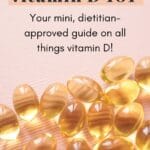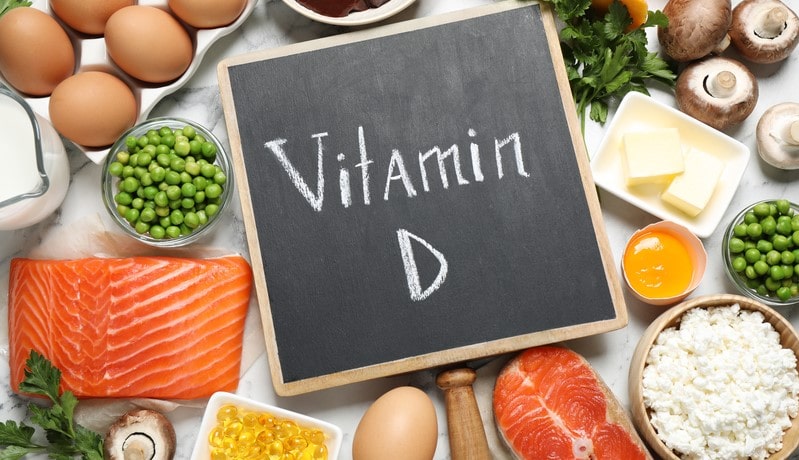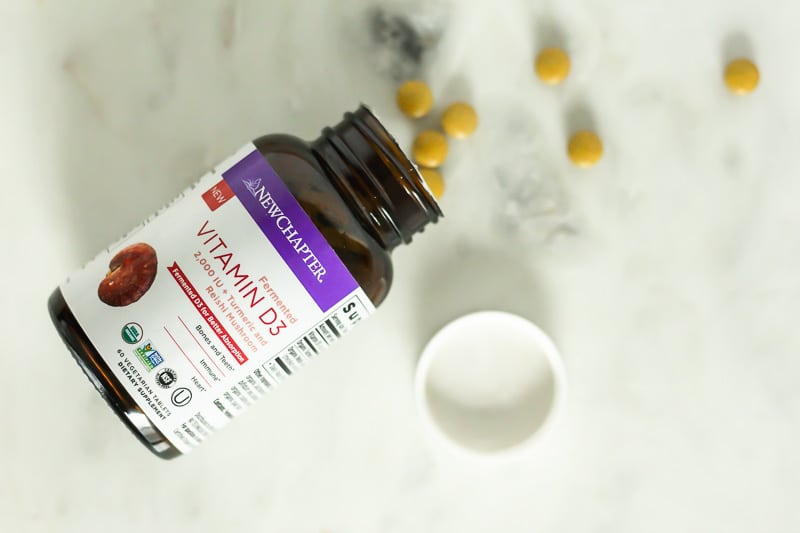Vitamin D 101 – Your Mini Guide to Vitamin D
Vitamin D seems to be getting more and more attention these days, which leaves us filled with questions, like what is vitamin D, what are the health benefits of vitamin D, and should I take a vitamin D supplement? Here’s your Vitamin D 101 crash course.
This post is sponsored by New Chapter, maker of whole-food vitamins & supplements. All opinions are my own.
Vitamin D 101 – What is Vitamin D?
Funny enough, vitamin D isn’t technically a vitamin. It functions more like a hormone than a vitamin because of its ability to be produced by the body when exposed to sunlight. In fact, we get most of our vitamin D this way!
We also get it from food and supplements, too.
There are two main forms of vitamin D:
- Vitamin D3 (cholecalciferol): found in animal foods
- Vitamin D2 (ergocalciferol): found in plant foods
Since (last time I checked) we’re not plants, our bodies produce vitamin D3. When your skin is hit with UV rays from the sun, it makes vitamin D from a cholesterol compound found in the skin.
How does Vitamin D function?
Vitamin D is the MVP of vitamins (even though it’s technically not even a vitamin). It’s involved in almost every part of the body, from cell growth, to the immune response to muscle movement to helping nerves carry messages from the brain to different parts of the body.
One of its most well-known functions is helping the body to absorb and retain calcium and phosphorus, two minerals essential to bone health. Vitamin D helps deposit calcium and phosphorus in bones and teeth, which helps keep them strong and ultimately, reduces the risk of fractures.
Potential health benefits of vitamin D
Before we dive into some possible health benefits, let’s be clear…most of these benefits are seen when people who are vitamin D deficient restore their vitamin D levels back to normal.
Vitamin D & Bone Health
Not getting enough vitamin D and calcium over time can increase the risk of bone-related issues, like osteoporosis (loss of bone mass). It is widely known that adequate calcium throughout life, as part of a well-balanced diet, may reduce the risk of osteoporosis.
That’s why experts encourage us to get enough vitamin D to meet recommended levels; it’s a simple way to support your bone mass and strength, especially as we get older.
Here’s the thing: when there is no deficiency, large doses of vitamin D via supplements do not seem to offer any benefit, according to recent study; in fact, it could even be harmful.
And vitamin D in and of itself, is not a silver bullet. Like most things, it is a combination of nutrients (calcium and vitamin D) and lifestyle practices (like exercise) that ultimately keep our bones healthy and strong.
Vitamin D & Immune Health
Scientists have long believed that vitamin D plays an important role in the functioning of the body’s immune system.
According to a recent review, daily supplementation of Vitamin D resulted in reduced respiratory infection risk for participants of 25 different studies, whether or not they were deficient in the vitamin from the start. For those who were deficient, daily supplementation cut their risk of upper respiratory infection in half.
Although the research is promising, more is needed before we can say for certain that vitamin D supplementation protects against colds and the flu. Regardless, don’t skip your flu shot and be sure to practice healthy habits to protect yourself and others during cold and flu season.
For tips on how to support your immune system naturally, click here!
Other Possible Benefits of Vitamin D
- Hair: Vitamin D deficiency has been observed in people experiencing hair loss. Alopecia areata is an autoimmune disorder that results in significant hair loss. Studies have found a link between lower vitamin D levels and this condition, indicating that low levels may be a risk factor for developing the disease. It’s suggested that vitamin D plays a role in hair follicle cycling, although this role isn’t well understood yet.
- Mental Health: Low levels of vitamin D have been linked to depression, according to a recent review. Supplementation to restore levels to normal limits may be helpful.
- Weight Loss: To date, it seems there is no clear effect of vitamin D on weight loss according to a recent review. In one study, women who were previously deficient in vitamin D experienced greater improvements in weight loss when they replenished their vitamin D levels.
How to know if you have a Vitamin D deficiency
You can be vitamin D deficient and not even know it. The signs and symptoms are often subtle and non-specific, meaning it is hard to know if what you’re experiencing is because of a vitamin D deficiency or something else.
The best way to know if you are deficient is to get your blood levels checked.
Common symptoms of low vitamin D:
- Fatigue
- Muscle or bone pain or weakness
- Bone loss
- Mood changes, like depression
- Getting sick frequently
Talk with your doctor if you think you may be deficient in vitamin D.
Who’s most at risk of vitamin D deficiency?
Vitamin D deficiency is one of the most common nutrient deficiencies. About 42% of the population in the United States is deficient, with minority groups having much higher prevalence rates.
The 2015-2020 dietary guidelines listed vitamin D as a nutrient of concern for Americans, and you may have noticed vitamin D is now on the Nutrition Facts Labels.
Who’s most at risk of vitamin D deficiency?:
- Elderly men and women: Mobility can become an issue as we age, making it more difficult to spend time outdoors generating vitamin D from the sun. Aging skin isn’t able to synthesize vitamin D as efficiently as younger skin. Also, the kidneys play a major role in turning vitamin D into its active form. Kidney function may deteriorate as you age due to illness, medications, and other conditions.
- Individuals with darker skin: Individuals with darker skin have more melanin (the pigment responsible for darker skin) in the outermost layer of their skin, which doesn’t absorb as much UV radiation. This makes it more challenging for the body to produce vitamin D from sun exposure.
- Individuals with fat malabsorption: Vitamin D is fat-soluble, meaning it requires some dietary fat to be absorbed. Those with impaired/reduced ability to absorb dietary fat, such as those with certain forms of liver disease, Chrohn’s disease, and cystic fibrosis, may be at greater risk of vitamin D deficiency.
- Individuals with higher body fat percentage: Although the exact mechanism remains unclear, those with higher levels of total and abdominal fat are more likely to have lower vitamin D levels and possible deficiency.
Sources of Vitamin D
Sunlight
If you enjoy spending time outdoors, you may be able to get all of the vitamin D you need. Typically, 5 to 30 minutes of sun exposure (without sunscreen) between 10am to 3pm at least a few times per week is a good guideline to follow.
But, keep in mind, too much sunlight also increases the risk of skin cancer and aging of skin, so apply sunscreen and wear protective clothing when you’re out for extended periods of time.
Food Sources of Vitamin D
Unfortunately, very few foods are natural sources of vitamin D. Here are the primary ones:
- Salmon, tuna, mackerel and other fatty fish or fish liver oils (check out this Everything Bagel Salmon recipe)
- Egg yolks
- Mushrooms exposed to UV light
- Beef liver and cheese
Certain foods, like cow’s and plant-based milks, yogurt, orange juice, and breakfast cereals are also fortified with vitamin D.
Vitamin D Supplements
The sun is your best source of vitamin D. So, if you dream of the sun more than you actually see it, you may want to consider a vitamin D supplement. You’ll find both vitamin D2 and vitamin D3 in supplement form.
Best form of vitamin D to take
The two most common forms of vitamin D in supplements (and your diet) are vitamin D2 and vitamin D3. Research shows that vitamin D3 is more effective at increasing blood levels of vitamin D, so look for this form in when choosing a supplement.
Best vitamin D3 supplement
My go-to is New Chapter’s Fermented Vitamin D3 – an easily digestible, fermented Vitamin D3 supplement that includes 2,000 IUs vitamin D3 plus added turmeric and reishi mushroom. New Chapter’s D3 is uniquely fermented and crafted for absorption of the vitamin letting you maximize intake.
When to take vitamin D for best absorption
Vitamin D is better absorbed with meals. As mentioned earlier, it’s a fat-soluble vitamin, which means it is absorbed best when we eat it with healthy fats, like avocados, nuts, seeds, eggs, dairy.
Heck, why not have them with avocado toast for breakfast! Simple enough.
The next most important thing: consistency. Many people find it easiest to remember to take their supplements in the morning; others at night.
Find a time that works for you, and stick with it.
Bottom Line
Vitamin D (aka the sunshine vitamin) has numerous important roles in the body, including supporting bone and immune health. If you are Vitamin D deficient, supplementation that brings your Vitamin D back to normal levels can support your health needs
Regular sun exposure is the best source of vitamin D. So, individuals with limited sun exposure may want to consider a quality vitamin D supplement, such as New Chapter’s Fermented Vitamin D3.










Is it true that vitamin D supplements do not absorb properly without Vitamin K2 along side of it?
Hi Darren! I’m so glad you asked this question! This is a common misconception–vitamin K2 doesn’t affect the absorption of vitamin D. The reason you’ll find them together in supplements, mostly bone health supplements, is that they both play a central role in calcium metabolism and therefore bone health. Vitamin D promotes the production of vitamin K-dependent proteins that regulate calcium deposition. These vitamin K-dependent proteins, as the name implies, require vitamin K for activation. As the evidence currently stands, it isn’t necessary to take them at the same time for optimal calcium metabolism and bone health. However, you may want to take a combined pill out of convenience if you do decide to supplement both vitamins.
Something interesting that I found is that consumerlab.com (a trusted, evidence-based supplement review site) mentions that vitamin K (a fat-soluble vitamin) absorption may be reduced when taken at the same time as other fat-soluble vitamins, and this has been demonstrated with high doses of vitamin E (a fat-soluble vitamin). Vitamin D is a fat-soluble vitamin as well; however, there is no evidence that it impacts vitamin K absorption (yet). I wouldn’t be too worried about this, just thought it was interesting.